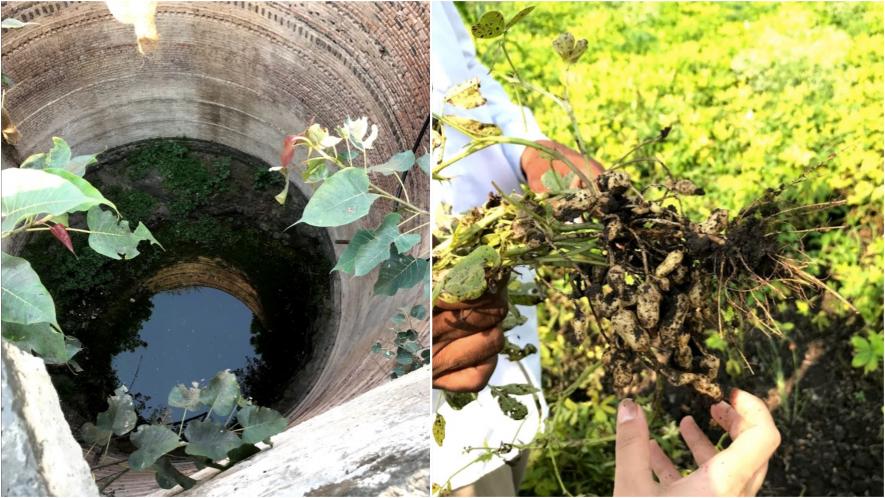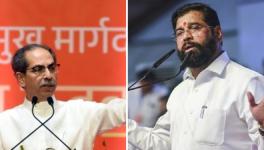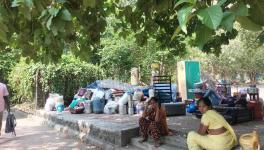Water Politics in a Maharashtra Village: A Case Study

A small village in Maharashtra is a showcase for some of the problems facing farmers in large swathes of the country – lack of irrigation, lack of electricity, high costs of inputs and low returns, and also power politics that directs largesse towards the powerful, abandoning common farmers to disaster.
Farmers of Ambodi in Pune district, Maharashtra, have little hope that the government will ever do anything to alleviate their problems. And problems are aplenty. Despite multiple protests and repeated promises, they are still deprived of basic facilities such as water and electricity. They are also unable to get fair prices for their crops, such as peanuts, sitafal, onion, etc, since there is no provision for fixing Minimum Support Price (MSP) for them.
The Purandar sub-district, where Ambodi is situated, has been drought-prone for decades now. Every time there are elections, promises of uninterrupted water supply are renewed. Every election farmers vote hoping to see some progress. Only about 17 km away from the village is Nazare dam. It would be easy to build a canal and bring water to the parched fields of Ambodi. But that has not happened.
Why? The answer lies in local politics of the area.
“People don’t even have water to drink here. The water meant for our tehsil is sent to Baramati,” said Suresh Borkar, a farmer in Ambodi.
And what is so significant about Baramati? It is Sharad Pawar’s constituency. It is an area which is known for its transformation from a barren land to a booming and flourishing industrial and agricultural growth centre. This transformation started in 1988 when Pawar became the Chief Minister of Maharashtra for the second time. He introduced cash crops such as sugarcane into the sub-district, which led to Baramati becoming a huge exporter of sugar. Sugarcane is also one of the few crops for which the government has fixed a ‘Fair and Remunerative Price’ this year.
Farmers of Ambodi say no one in their sub-district of Purandar can grow sugarcane as it needs too much water. In fact, growing of sugarcane doesn’t make much sense anywhere in drought-prone Maharashtra.
According to data from the sugar industry body Indian Sugar Mills Association (ISMA), the cane crop from a hectare of land in Maharashtra, consumes about 70 lakh litres of water on an average. In Maharashtra, about 80% of this gigantic water consumption is sourced from irrigation, mainly groundwater, while the balance 20% is rain-fed. Yet the government has actively encouraged it by ensuring that farmers are supplied with enough water, and paid better prices compared to other crops.
Farmers of Purandar and many such areas in Maharashtra are dependent on rainfall and groundwater for irrigation. Groundwater levels have receded significantly. But even to access the little groundwater that is left, farmers need electricity to draw out this water. It is another basic amenity of which there is an acute shortage.
“When there is water, there is no electricity. When there is electricity, there is no water,” Borkar says.
Fields are supposed to get electricity supply for eight hours every day. But the village hasn’t got any power for the last twelve days. The sarpanch of the village had sowed dhaniya (coriander) twelve days ago. But since there was no electricity, the crop remained unirrigated. Coriander generally takes a month to grow, almost half of which had gone by without water. Hope is dying for her precious crop.
PM Modi had announced with much fanfare a revamped crop insurance scheme (Pradhan Mantri Fasal Bima Yojana, or PMFBY) to take care of precisely such contingencies. But that too is not happening in this area. Farmers say that they never receive any compensation for claims.
“Government officials come sometimes to check the crop conditions. But our claims are never paid,” Borkar said.
The farmers are eagerly awaiting some relief from the loan waiver promised by Devendra Fadnavis, Maharashtra’s Chief Minister, after massive farmer protests, though riddled with multiple terms and conditions He had initially announced that the money for the waiver will be distributed by end of October. When the farmers protested saying it will be too late by then and they will not be able to sow their crops, Fadnavis promised a sum of Rs 10,000 to every farmer as interim relief in June.
“He promised us Rs.10,000 but we haven't even gotten ten rupees till now,” Borkar said.
Thus, life goes on in Ambodi, a struggle for survival, with periodic highs of promises and hopes, followed by disappointment. Currently, they are hoping that their sitting MLA Vijaybapu Shivtare will resolve these issues. Time will tell whether this happens.
Disclaimer: The views expressed here are the author's personal views, and do not necessarily represent the views of Newsclick.
Get the latest reports & analysis with people's perspective on Protests, movements & deep analytical videos, discussions of the current affairs in your Telegram app. Subscribe to NewsClick's Telegram channel & get Real-Time updates on stories, as they get published on our website.























